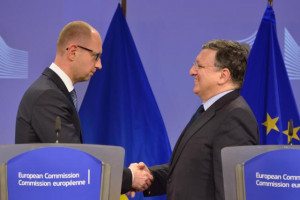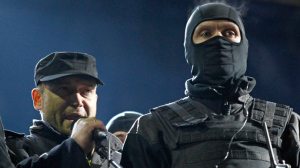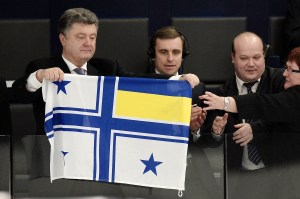
The EU is of course weighing in, but not by trying to guarantee free and fair elections, as might be expected. Its contribution to Ukraine’s democratisation has been to suggest that once the elections are held the country will then be a step closer to EU membership.
Really? Turkey has regular elections, why is it not in the EU? Did not the outgoing President of the European Commission, José Manuel Barroso say on May 21 that Georgia, which was long told that it would accede to the EU and NATO together with Ukraine, will not be accepted into the EU?
Georgia has a freely elected government which campaigned on a platform of prosecuting the previous one for its many crimes, as they would be for similar crimes in an EU country. It is about to sign an Association Agreement with the EU, which Brussels would not sign with the previous government. But it is not going to be offered EU membership in the foreseeable future. So Ukraine in its present state will get closer, will it?
Barroso also reiterated the EU’s support for the upcoming presidential elections, saying that they are of great importance in stabilising the situation in Ukraine. It was, of course, during Barroso’s term of office that the destabilisation of the country began, in response to Ukraine refusing the EU’s ultimatum to either turn its back on Russia completely or forget about EU assistance. It has also, with its US allies, undermined two previous Ukrainian presidential elections, at the time and after the fact, in order to remove the elected man it doesn’t like, Yanukovych.
Close is not good enough
The Ukraine elections are an attempt to give legitimacy to illegitimacy by turning the removal of the democratically-elected government into a popular uprising rather than an externally orchestrated coup. The EU wants everyone to believe that if people vote for the putschists, regardless of what other choice they are offered, their actions must be right.
Is it an Orange Revolution, once again? What happened to that scheme? The next election, Ukrainians elected Yanukovych, who the revolution had sought to sweep away. How the installation of a new regime can be called a “revolution” when the old regime is re-elected at the first opportunity is something for the compilers of dictionaries to decide.
The Ukrainian elections are thus an exercise in Potemkin Democracy, the very thing EU membership, with its obligation to accept Western democratic rules, is supposed to stop. But, as always, everything is being considered acceptable as long as it results in EU membership.
Once they’re accepted into the EU all will be OK, Ukrainians are being told. All they have to do is play by the rules. The EU has set those rules: take part in the elections, vote for the people we have supported and not those we have demonised and all will be well.
Little things like not intimidating voters, equalising media time and campaign spending and ensuring plurality of choice, hallmarks of the EU’s democracies, do not matter as long as the process is followed and the EU gives its seal of approval. But as we have seen in Georgia, which is actually closer to EU membership than Ukraine, what will the outcome be? Ukraine will justify the EU’s political position by electing those it sees as representing it, but will still not be given actual membership in return.
All about gas
As part of its campaign to gain legitimacy for the new Ukrainian regime, the EU is trying to avoid discussion of the political background to these elections, or indeed any ideological discussion. It is trying to divert attention to more practical issues, like paying its bills for gas, as if the choice of the Ukrainian people will be a purely rational one, not motivated by dreams of EU membership and visa free travel throughout Europe.
In a recent letter to President Vladimir Putin, available online Jose Manuel Barroso wrote, on behalf of the EU and its 28 Member States, that the EU is ready to continue substantive trilateral discussions in order to ensure the stabilisation of gas supplies to Ukraine and gas deliveries via Ukraine into the EU, and help find a rapid and sustainable solution acceptable to all parties.
“It is the European Union’s clear expectation that all sides will remain reliable and responsible supply and transit partners, which is also very much in their own interest. The European Union and other international donors have already provided significant support to Ukraine and will remain committed. I also expect a constructive approach from the Russian Federation to solve the issues at hand.”
This letter should be read in the context of what has gone before. If Russia wanted to recall Ukraine’s arrears to Gazprom it could turn off the taps immediately, and has a right to do so under the terms of the gas supply agreements. As Ukraine remains dependent on Russian gas it has to find some way of cohabiting with Russia, like it or not. Nothing the EU offered in its Association Agreement negotiations with Yanukovych changed that, and nor could it, with the Eurozone in the crisis it is in.
Yanukovych therefore tried to accept help from both sides, a situation neither were happy with, but resulted in the EU, not Russia, giving him an ultimatum to put all his eggs in one basket. Now the EU will say that Ukrainian voters still want exclusive adherence to the EU despite the gas issue, because it has been thoroughly discussed in this campaign and an EU-favoured candidate has still won.
With Ukraine and Russia having come to being on the verge of war over Crimea, what would be the consequence of electing a pro-Russian candidate, or supporting the actual elected president, Yanukovych? Is there really any choice but to support an EU-favoured candidate? But, as often happens in Western democracies, people will vote for one reason and then be told that they have supported something else entirely, which was part of the programme but nothing to do with why that candidate was supported.
Narrow field of candidates

Yulia Tymoshenko – once jailed for her involvement in shady gas deals with Russia and famous for her threats to solve the Ethnic Russian Question by nuking them, is also on the ballot. The situation has evolved into a proverbial tug of war between those that want to protect their Russian culture and language, found predominately in the East and the Nationalist who have been supported and egged on by the West, especially the United States.
However there are already signs that Ukraine’s voters are, even in this constricted circumstance, not willing to follow the script. The vast majority are distancing themselves from extremist nationalists like Oleh Tiahnybok, from the Svoboda party, and Dmitry Yarosh, from Right Sector, because of their activities during the Euromaidan protests and their provoking of many needless and brutal deaths. These are the protests the West told the world were about joining the EU, which these inserted nationalists should be the main beneficiaries of.
The EU is now embarrassed by these far rightists too, but not so much that it wouldn’t treat their election as a validation of itself. Of the other candidates, the most prominent is former Orange Revolution Prime Minister Yulia Tymoshenko, later jailed for her involvement in shady gas deals and famous for her threats to solve the Ethnic Russian Question by nuking them. Her election would put Ukraine back to square one and stoke further crisis, so she is not a serious contender while the people still see violence on their doorstep.
Indeed, Ukraine is now in the same situation as Georgia in this respect: it wants the idea of the EU, but not the reality. In practice, the EU has meant destabilisation just as much as modern Russia has.
It was Russia’s attempt to help prevent Ukraine defaulting – to Western banks and the IMF – by agreeing to provide 15 billion in direct economic relief which set off the alarm bells in Brussels and Washington. It was the subsequent Western response to this offer, not the offer itself, which created virtual civil war, and the most pro-Western Ukrainians have not forgotten this.
So what happens next?

His emergence as a candidate is very reminiscent of the parachuting in of fellow billionaires Bidzina Ivanishvili in Georgia and Milan Panic in former Yugoslavia. As in those cases, the glamour of wealth is likely to make all politicians seem petty and venal and ensure his victory. As in those cases, he has been sponsored for the presidency precisely because he is a “none-of-the-above” candidate in a country with too many who stood for office before got to do so by being darlings of the EU.
Will the elections bring stability, as the EU suggests? Very unlikely! The turnout will be much higher in Western Ukraine than in Eastern, as most of the ethnic Russian population no longer feel that Ukraine has anything to do with them. They will likely boycott the elections as they don’t claim to be part of Ukraine anymore. But this will create a vacuum which many forces will be keen to exploit – everyone has their own idea of what a fully Western Ukraine should be like, and the absence of the Russian electorate will give them carte blanche to try and claim the whole of what remains of the country to themselves, a common post-change scenario.
Putin stated on 23 May that he will respect the will of the Ukrainian people. If he keeps his word, this will do more to stabilise Ukraine than anything the EU is doing, as it will clear a pathway for resolution of the conflict by giving a new, recognised Ukrainian team the chance to do so and a voice to the Ukrainians who look to Russia. This may, ultimately, bring about an outcome acceptable to most Ukrainians. It would be nice if, at the third time of asking, the EU also accepted that Ukrainians have a right to conduct their own affairs, like EU member states.
Elections exercise in wishful thinking
Just what will change once the ballots are counted in Ukraine is the question that few are asking, and if holding elections will make any difference in the first place. There is not going to be a military intervention on the horizon by Russian Federation or wholesale annexation of the ethnic Russian part of the country, as in the Eastern region which borders the RF.
It is a question even if the East (like those regions of Donetsk and Luhansk) will participate, and even if it did, what difference, if any, would it make in their lives and expectations for the future? It is even possible that elections will make a complicated issue even more so. The Geneva Roadmap documents seek for all sides to refrain from any violence.
As the Russian Ministry of Foreign Affairs has written:
“Without the implementation of the Geneva Roadmap Agreements, [of April 17] the road map, and the immediate cessation of hostilities by units of the Ukrainian Army in the southeast of the country, the May 25th Election can only worsen the situation
The document included how proposed constitutional process will be inclusive, transparent and accountable. It will include the immediate establishment of a broad national dialogue, with outreach to all of Ukraine’s regions and political constituencies, and allow for the consideration of public comments and proposed amendments.
The participants underlined the importance of economic and financial stability in Ukraine and would be ready to discuss additional support as the above steps are implemented. The key issue is if all stakeholders to the agreement are serious, as it calls for all acts of violence must be promptly investigated and prosecuted.
The OSCE Monitoring Mission is setting up Rapid Response Teams with specific areas of expertise and will assist Ukrainian authorities upon request. The task of these teams is to establish and report facts on specific incidents. A hotline for alerting the Monitoring Mission should be running soon.
The document also stipulates that Ukraine may join any political or economic union on the condition that the majority of the population votes in favour in a nationwide referendum.
Key Election Issue
The vast majority of the population are distancing themselves from the likes of extremist nationalists Oleh Tiahnybok from the Svoboda party and Dmitry Yarosh from Right Sector because of their activities in the Euromaidan protests and the ensuring destabilizing of the country and many needless and brutal deaths.
Key issues in this election will be to pick up again with European integration, and that too is a point that has people tired, and the start of the current debacle in Ukraine after the EU made an ultimatum that Kiev under former president Yanukovych in November of last year that started the unravelling of democracy and has put the territorial integrity of Ukraine at risk.
Russia was prepared to work with Ukraine and the EU and it had already agreed to provide 15 billion in direct economic relief to keep the country from going financially belly up—defaulting. The set off the alarm bells in Brussels and Washington. Such close economic relations and was unacceptable to the EU and its Western supporters as a matter of policy. They forced Kiev to make a choice between the competing EU supported “Association Agreement and Russia’s Custom Union”.
EU did not provide the option for Ukraine to have it both ways. With the former president out of the picture and the EU and Ukraine’s interim authorities trying to make hay whilst the sun shines, the association agreement is back on the agenda. Already some protocols have been signed but the damage from the unrest and motivations for the crisis in the first place is becoming clear to Ukrainians.
Elections will solve little – perhaps provide some breathing space and give Ukrainians the time to reflect on who really has their best interests in mind. So don’t expect any significant changes and that Ukraine will be emerge from the elections as a unified country and Crimea will come crawling back to be part of the fold.
Wishful intentions and reality is another factor – and some lessons should be gleaned from the never ending promises of EU and NATO membership for Georgia, in terms of an interim association agreement and the promise of a NATO Membership Action Plan. The outcome of the election is pretty much a given, and there will be no surprises with the leader most like heading for a first round win if he is able to get more than 50 percent of the vote.
As reported in the Western Media, both the US and EU already appear to regard Poroshenko’s victory as the most likely outcome. Some pundits go as far as to claim that the Kremlin may view him as the most acceptable person, a person that Russia can deal with. He is also the most acceptable choice to all concerned, including the West, as the “none-of-the-above” candidate.
Seth Ferris, investigative journalist and political scientist, expert on Middle Eastern affairs, exclusively for the online magazine “New Eastern Outlook”.
